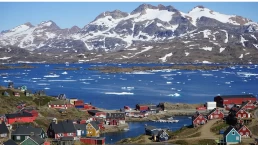As the president-elect’s call to buy—or take—a sovereign country moves from punchline to possibility, a look at the real stakes of the Arctic’s mounting cold war.
By Adam Federman, In These Times
When Donald Trump Jr. landed in Greenland last week — flying in aboard “Trump Force One,” with two of his father’s top advisors, plus right-wing activist Charlie Kirk, in tow — he claimed that he’d come as a tourist. Speaking to a small group of spectators at the recently opened international airport in Nuuk, a city of about 20,000 people just below the Arctic circle, he intimated that he was there to see the sights and gather material for his podcast on a “very long personal day trip.” Greenland, he said, is an “awesome country” and the scenery “spectacular.” After stopping by the national museum, he said he was impressed with the “old hunting styles” and “clothes” of the island’s early inhabitants.
The Trump team, in typical fashion, claimed victory after the visit, citing support from the locals in Nuuk and quickly distributing a polished, campaign-style video. But Politico, the Washington Post and Danish news outlet DR News have reported that the visit was at least in part “staged” and that many of the MAGA-hat wearing residents who dined with the president’s son were living on the margins and had essentially been bribed to attend.

One thing we do know is that Don Jr. was not there purely for natural beauty or local history. The bigger reason for his visit seemed to be advancing his father’s ambitions to acquire the island, which Donald Trump first floated in 2019 after reportedly being briefed at the White House by Greg Barnes, an Australian mining geologist and owner of one of the largest rare-earth deposits in Greenland. Ronald Lauder, a longtime friend of Trump’s and heir to the Estée Lauder fortune, has also pushed the idea.
Trump’s unsolicited offer to buy Greenland from Denmark — which first colonized the island in the 18th Century and still retains control of its security and foreign policy — was widely lampooned at the time. The Danish prime minister called it absurd, sparking a row between the two countries and leading Trump to subsequently cancel a planned visit to Denmark. The bid essentially went nowhere beyond late night punchlines.
Recent Posts
New Addition to List of Nuclear Near Catastrophes
February 25, 2026
Take Action Now Debris flew for great distances — many times the distance of 270 meters to a nuclear reactor and nuclear storage facility.By David…
Gavin Newsom’s last budget belies his ‘California for All’ pledge
February 24, 2026
Take Action Now Yet, even as the state is poised to lose billions in federal funding, and millions of Californians are losing access to health care…
Israel and American Hawks are Pushing U.S. to Iran War With Catastrophic Consequences
February 23, 2026
Take Action Now At the World Health Assembly in May, member states may endorse an unprecedented strategy declaring that health is not a cost – but…
A Child’s View of the Attack on Venezuela. And a Peace Flotilla
February 23, 2026
Take Action Now Fabricio said that he and his family went out of their building and saw many people also going outside, running around, and kids…




